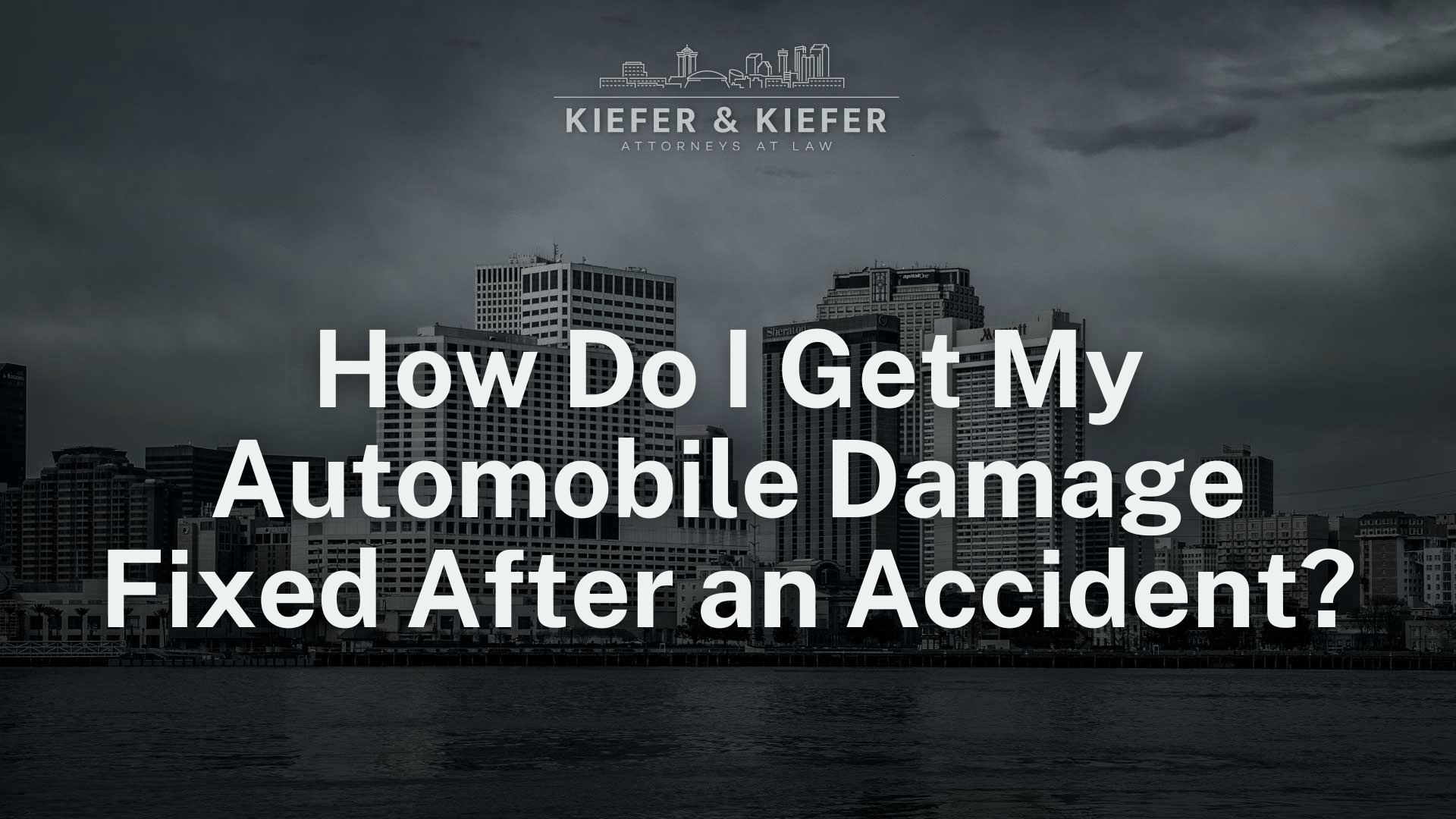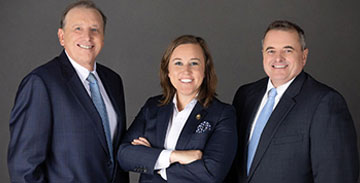After an automobile accident, many people do not know what to do next or how to get their vehicles fixed. Such accidents cause many people stress and anxiety because they may be injured and likely do not have a working vehicle to accomplish their daily tasks. After being injured in an accident, many of our clients have questions about their property damage. At Kiefer & Kiefer, we strive to assist and to educate our clients on this process, so that they may return to normalcy as soon as possible.
Luckily, Louisiana law provides a clear framework for how drivers can get their cars fixed by their insurance company or the at fault driver’s insurer. Many clients do not want to make a claim with their own insurance if they have collision coverage (first-party claim) and would prefer to have the insurance company of the at-fault driver pay for their property damage (third-party claim).
This process can be completed by a Louisiana driver without the help of an attorney- if they know their rights under the law. However, this process can be challenging and may require the assistance of an attorney who specializes in property damage claims.
Overview of Automobile Insurance in Louisiana.
Many Louisianians do not know the basic requirements for automobile insurance and how to make a claim with their insurance provider. This short outline will assist with what is required to be in compliance with Louisiana law, so that you will be covered by insurance for an accident, and what to do after an automobile accident.
- Buy mandatory minimum auto insurance with at least $15,000 per person and $30,000 per accident liability coverage. However, we suggest that drivers also purchase collision coverage and uninsured/underinsured motorist coverage.
- After an accident, documenting it by taking pictures, calling law enforcement, and gathering relevant information, such as contact details and insurance information, are super important for supporting your claim.
- After the accident, quickly open a claim with your insurance company by calling their claims number or using an app provided by your insurer. If you have the other driver’s insurance information, you should also open a claim with their insurance provider.
- Follow their instructions to show a satisfactory proof of loss, which usually includes sending pictures and giving a statement of how the accident occurred.
- While your insurer evaluates your claim and the compensation amount, maintain contact with the property damage claim adjuster to ensure that the process is moving forward.
- You are allowed to choose a repair shop and may be required to submit estimates for your property damage to the adjuster.
- If you encounter disputes or disagreements during this process, you may need to hire an attorney who can provide assistance and advocate on your behalf to protect your rights.
Louisiana law and Claims for Fixing Your Automobile.
The regulation that controls the timelines for adjusting injury and property damage claim and making payments for a claim are governed by La. Stat. Ann. § 22:1892. Whether it is your insurer or the other driver’s insurer, this law controls both first-party and third-party claims. This statute is long and complicated but can be broken down, so you know your rights under Louisiana law.
Under La. Stat. Ann. § 22:1892, there are four subsections (A)-(D) in which each subsection controls a separate aspect of the claims process between insurers, insureds, and third-party claimants.
- Subsection A addresses the insurer’s deadlines with respect to certain actions it must take when adjusting insurance claims of first-party insureds and third-party claimants.
- Subsection B addresses the penalties that may be assessed against an insurer that fails to comply with the duties it owes to first-party insureds and third-party claimants under Subsection A; and it also establishes additional duties the insurer owes to third-party claimants.
- Subsection C sets forth the manner in which the claims of first-party insureds and third-party claimants must be paid.
- Subsection D provides that an insurer cannot condition the payment of a claim upon the requirement that the repairs be made at a particular place or shop or by a particular entity and governs the insurer’s relations with its insureds or third-party claimants bringing claims under an insurance policy.
Deadlines and Requirements for Insurers Under La. Stat. Ann. § 22:1892
- Satisfactory Proof of Loss
- After opening a claim, you must provide satisfactory proof of loss of your property damage to your insurance company or the other driver’s insurer. Satisfactory proof of loss may include sending pictures or other evidence, having an adjuster inspect your vehicle’s damage, or having a repair shop write an estimate for fixing your car.
-
- Time for Insurance Company to Evaluate Claims
- Except for catastrophic loss, insurers have 14 days to initiate a loss adjustment for property damage claims and claims for reasonable medical expenses after notice of loss by the claimant for both first-party and third-party claims. La. Stat. Ann. § 22:1892(A)(3).
- For catastrophic losses, insurers shall initiate a claim within 30 days of notification of loss by the claimant. La. Stat. Ann. § 22:1892(A)(3).
- An insured can request a copy of the insurer’s field adjuster report for their property damage claim, and the insurer shall issue a copy within 15 days of receiving the request. La. Stat. Ann. § 22:1892(A)(5).
- Time for Insurance Company to Evaluate Claims
- Timeline for Settlement Offer for Property Damage Claim
- For both first-party and third-party claims, insurers must offer to settle any property damage claim within 30 days of receipt of satisfactory proof of loss. La. Stat. Ann. § 22:1892(A)(4).
-
- Time for Insurance Company to Pay Claim Amounts
- All insurers shall pay the amount due for any claim within 30 days of receiving satisfactory proof of loss from the insured or any party who has an interest. La. Stat. Ann. § 22:1892(A)(1).
- For third-party claimants, insurers shall pay the amount of any property damage claim and of any reasonable medical expenses claim due any bona fide third-party claimant within 30 days after written agreement of settlement of the claim. La. Stat. Ann. § 22:1892(A)(2).
- Time for Insurance Company to Pay Claim Amounts
- Repairing Automobile Property Damage
- When paying a property damage claim, no insurer shall require repairs of the automobile to be completed at a particular place or by a particular entity. La. Stat. Ann. § 22:1892(D)(1).
- An insurer shall not recommend the use of a specific automobile service or repair shop without informing the claimant that they are under no obligation to use that service. La. Stat. Ann. § 22:1892(D)(2).
-
-
- An insurer shall not engage in any act or practice of intimidation, coercion, or threat to use a specified place of business for repair and replacement services. La. Stat. Ann. § 22:1892(D)(3).
-
- Rental Reimbursement
- When a third-party claimant makes a property damage claim for a personal vehicle and the claimant is deprived of using the vehicle for 5 working days due to the inactions of the insurer, the insurer responsible for covering the accident shall pay for reasonable expenses incurred by the third-party claimant for renting a vehicle for the entire period of time the claimant is without use of their personal vehicle. La. Stat. Ann. § 22:1892(B)(4).
- Evaluating the Value of Total Loss Property Damage Claims
- For first-party claims for total losses when the insurer elects a cash settlement based on actual cost to purchase a comparable vehicle, costs shall be derived by using one of the following methods:
- Fair market value survey of qualified auto dealers in the local market;
- Retail cost determined from a generally recognized motor vehicle industry source, like Kelly Blue Book; or
-
-
-
- A qualified expert appraiser selected and agreed upon by the insured and insurer. La. Stat. Ann. § 22:1892(B)(5)(a)-(c).
- Depreciation for property damage claims includes but is not limited to the cost of goods, materials, labor, and services necessary to replace, repair, or rebuild damaged property. La. Stat. Ann. § 22:1892(B)(6)(a)(ii).
- An insurance policy covering damaged property may allow for depreciation. La. Stat. Ann. § 22:1892(B)(6)(b).
- An insurance policy covering damaged property shall provide notice that depreciation may be deducted or withheld. La. Stat. Ann. § 22:1892(B)(6)(c).
- If depreciation is applied to a loss for damaged property, the insurer shall provide a written explanation as to how the depreciation was calculated. La. Stat. Ann. § 22:1892(B)(6)(d).
- Depreciation shall be reasonable and based on a combination of objective criteria and subjective assessment, including the actual condition of the property prior to loss. La. Stat. Ann. § 22:1892(B)(6)(e).
-
- Penalties for Noncompliance
-
- If an insurer fails to make a payment, to offer to settle a property damage, or to make a payment of a written settlement agreement within 30 days after receipt of satisfactory proof loss, such insurer shall be subject to penalties if such failure is found to be arbitrary, capricious, or without probable cause. La. Stat. Ann. § 22:1892(B)(1)(a).
- Penalties for “bad faith” of an insurer include:
- the amount of the loss plus 50% damages on the amount found to be due from the insurer to the insured, or one thousand dollars, whichever is greater, or
- in the event a partial payment or tender has been made, 50% of the difference between the amount paid and the amount found to be due, and
- reasonable attorney fees and costs.



